Hi everyone! My name is Libby McCusker, and I am one of the senior captains of the varsity Alpine ski team here at Clarkson and an innovation and entrepreneurship major. When I came to Clarkson, I was thrilled to be able to compete at the collegiate level in a sport that I had worked so hard at growing up. However, I had no idea that being a student athlete would give me countless skills beyond just how to go fast on the race course.
Being an elite athlete in college is one of the most challenging and rewarding things you can experience in life. A small portion of being a successful athlete depends on your actual skills on the field, on the court, on the hill or on the ice, while the rest is having mental strength and being a good teammate.
So whether you’re planning on competing at the collegiate level already, are on the fence about it, want to continue playing or are interested in a club or intramural sport, I would like to share with you the top three skills and attributes I have developed over the last four years that I will carry with me to my next adventure in life.
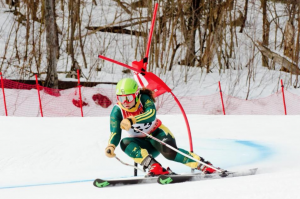
Time Management
Student-athletes are some of the busiest people on college campuses. Our days often begin before the sun rises and end at sometimes 10 or 11 at night. These days include classes, study, strength training, conditioning, practice, travel and games and meets. In order to manage this schedule, it is important to have strong time management skills.
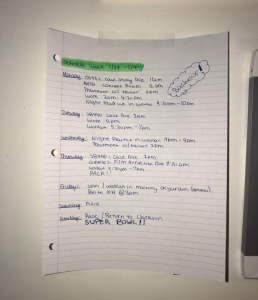
When you come to Clarkson, you are given a lot of support systems. As an athlete, you will be given an academic advisor for both your sport and your given major. When I first got on campus, I met my advisors right away and formed a time management routine that worked well for me. Every Sunday, I sit down for about 30 minutes and plan out what my week will look like. I include due dates, exams, practices, even things like when my favorite TV show is on, and then hang this above my desk so I know what is happening each day of the week. This is such an important skill to have, especially since being an athlete also requires a lot of flexibility (particularly when your sport is almost entirely weather-dependent). Having a schedule planned out can help you better manage changes in scheduling because you already have an idea of what your daily goals are.
Being Comfortable with the Uncomfortable
As a student-athlete, we are constantly pushing ourselves both physically and mentally to be the best we can be in many aspects of our collegiate careers. One of my coaches once told me that we find our most successful moments outside of our comfort zones, and I have found this to be very accurate and not just relevant on the hill. Our coaches, professors and teammates have high expectations for us, and we work hard to fulfill them, even when that sometimes means taking those few steps outside of our comfort zone.
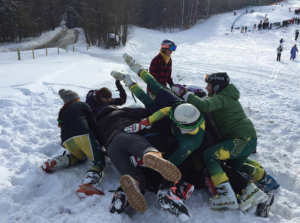
For example, if as a ski racer I spent my career thinking to myself in the start gate, “I’m just going to ski this safely, make sure I reach the finish line and not worry about gaining too much speed because then I may get hurt,” I wouldn’t have much success and probably wouldn’t have made it very far in ski racing in general. I am constantly pushing myself, seeing just how fast I can go, how close I can cut it without falling. One of the best coaches I ever had once told me, “If you aren’t falling, you aren’t trying.” This is so true. I spent an entire season once during which my parents would drive me more than two hours to race every weekend, and I finished only one or two races cleanly all season. It was in that season that I learned how to push myself, and I came back the next season finishing in the top 10. So a special shout out to Mom and Dad for continuing to drive me all over the northeast that season while knowing that the likelihood of watching me cross the finish line was slim, because that season really taught me the most! My coach was right: we are most successful when pushed to the point of being uncomfortable — it all really does come full circle!
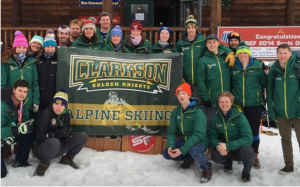
In addition to what I saw on the hill, there were many times in my internships and classes when I had to push out of my comfort zone, like when giving a presentation or tackling a case study I didn’t know much background information about. But this feeling of being uncomfortable was not foreign to me because it was something I experienced in my sport everyday. I know this won’t end when I move on to my full-time professional position. However, this time I already expect to be challenged and I crave to be tested, because through my experiences as a collegiate athlete, I realize success is derived from being outside your comfort zone.
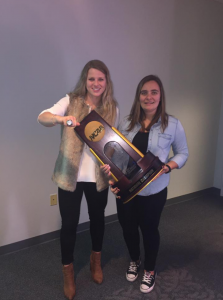
Community and Family
When you hit a certain level, your teammates turn into much more than people you work through plays or strategize with — they become your backbone, your best friends, your family. Your teammates experience everything that comes along with the sport right next to you. From the glorious moments of taking pictures with medals and trophies to the endless 6 a.m. wake-up calls and early morning practices where you sprint until your legs give out — they are next to you through it all. Some of my strongest friendships at school are those with my teammates, likely because we ride the emotional rollercoaster that is our sport, together. The bonds you form with your teammates are really something special and are by far one of the biggest takeaways from collegiate sports.
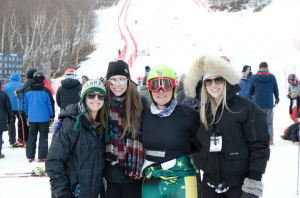
The family you develop through college athletics extends far beyond your immediate team as well. Some of my best friends at school are not on the hill with me every weekend. In fact, they are on the ice or on the court working toward their own goals, while I am on the slopes working toward mine. We all condition in the same gym, we go out and support each other and we hang out in our down time. From texting early morning good-luck texts to venting to each other when things don’t go the way we want, sharing this bond of competing at an elite level really gives us a sense of comfort with each other.

To wrap up this post, deciding to compete in a sport at the collegiate level was one of the best decisions I made. I chose Clarkson for the challenging academics, the fantastic job placement rate and the “I belong here” feeling I got when I stepped onto the campus. While being able to continue my passion for skiing was just an added bonus, it gave me some of my biggest takeaways from my college experience. I know that even once I graduate, I will remain a part of the Golden Knight family and can’t wait to see what the next group of young athletes bring to Clarkson’s programs!

Is skiing and hockey one of the more popular sports at Clarkson because of more chilly climate?
Yes and no. Skiing is popular because of our climate and being so close to lots of great skiing and snowboarding spots, even for students who have never skied or snowboarded before. Hockey is popular because we have Division I hockey and our teams are amazing (our women just won back to back ECAC championships AND were National Champions last year), so it’s really fun to go watch and support them. I said yes and no because we have tons of sports that are popular that don’t take place in snow/winter, everything from soccer, lacrosse, basketball, swimming, ultimate frisbee, equestrian, etc. You can find a listing of our varsity (Division I and III) teams at http://www.clarksonathletics.com and a listing of our club and intramural sports at https://www.clarkson.edu/node/35291. Hope this helps answer your question!
Hi Libby!
What a great article. It makes me, and I dare speak for the rest of the Council Coaches, so proud and happy to see you and the other Okemo kids such at the Riley boys, Greg Murray, Natalie Wetmore and many more, continue to ski race in college after growing up on Wardance at Okemo. You wrote an excellent article. Two things I would love to also mention about ski racing is that is fosters perseverance and passion; two qualities that you have truly demonstrated. We all know, it is a tough sport with lots of downs and a few ups! Well done and good luck in the future!